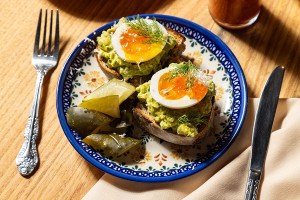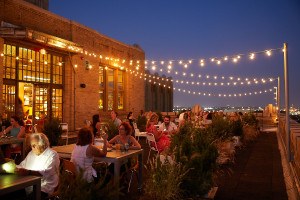Little Water: A Poetic Exploration of Land, Water, and Comfort Food
Randy and Amanda Rucker’s second act makes a splash with uni-topped scallops swimming in yuzu kosho and a simple plate of halibut and potatoes.
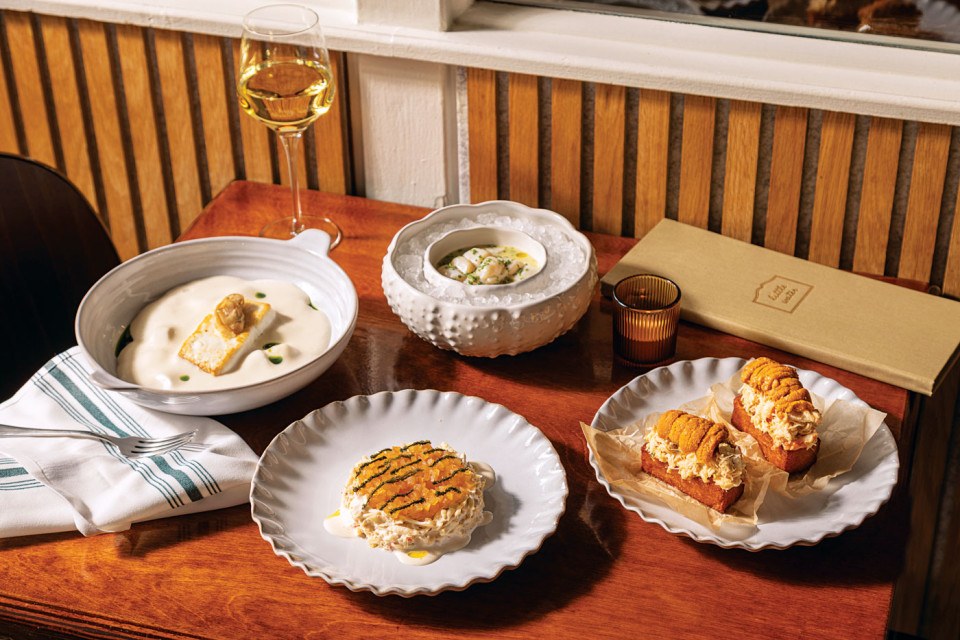
Spread at Little Water (clockwise from left): Halibut; raw bay scallops; hash browns with crab and uni; peekytoe crab salad. / Photography by Gab Bonghi
The bar fills up fast at Little Water. People roll in, sit down, group and ungroup, slip away. The crowd moves like the tide.
On the floor, it’s more stable. Reservations. Comfortable chairs. Pairs and four-tops spending an hour or two in a room so highly polished it seems to glow in the last light of a spring evening. The menu moves with the seasons, the floor with the flow of service. It is organic, unsettled, beautiful.
Some restaurants exist as edible history lessons. Some function as biographies. But Little Water is an exercise in cartography — in detailing those intersections where land and water meet. It is oysters dressed in Alabama white sauce and a house-made hot with a stinging kick. It is raw, pale pink sweet shrimp wearing curls of Maine uni with frills of bright fennel fronds laid in a pinwheel on a scalloped white plate like something lifted from Grandma’s china hutch, and fresh sourdough bread and butter sprinkled with flaked Henlopen sea salt harvested from the Delaware coast.
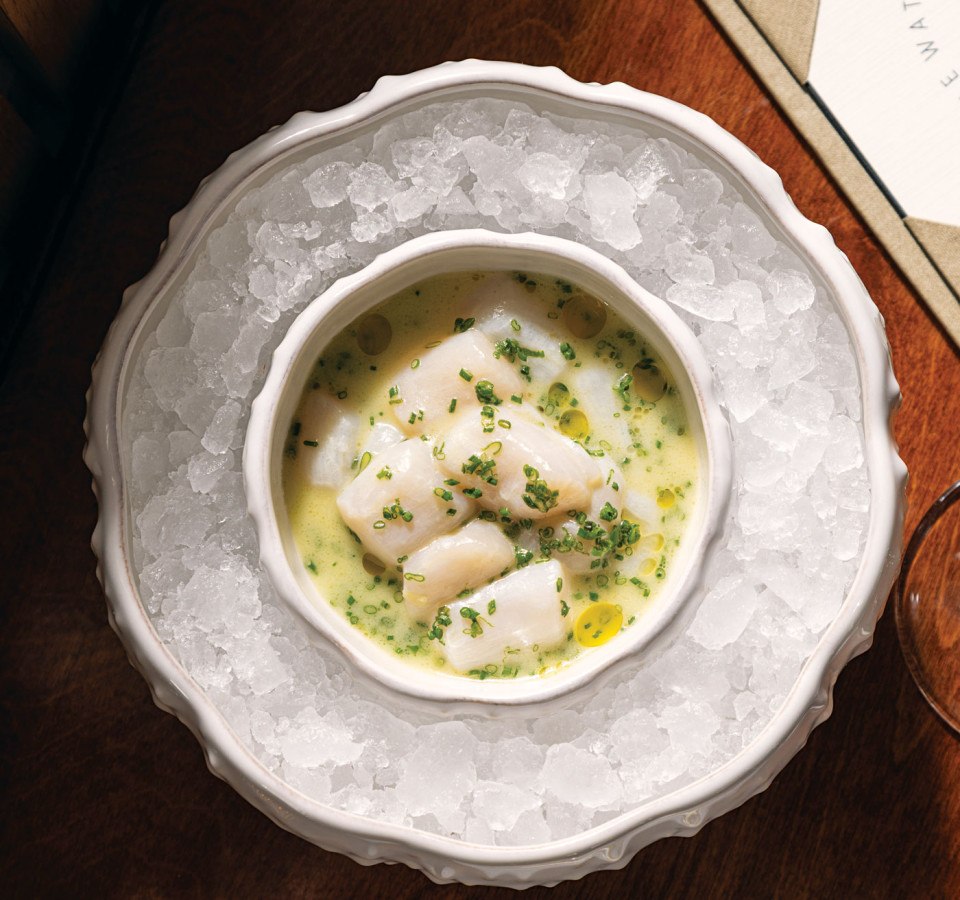
Raw bay scallops with yuzu kosho
Little Water is the new restaurant from husband-and-wife team Randy and Amanda Rucker. A second act following the success (critical, cultural, edible) of River Twice on East Passyunk, this new spot feels at once more polished, more personal, more soulful, and in every way just larger than their now five-year-old Philly debut. Opening it was, like everything these days, delayed and (like everything always) complicated, but if the static made by River Twice’s rustic heart and polished presentation rubbing up against each other felt surprising, stumbled into, almost accidental, then Little Water has a feeling of inevitability. Like this — with its Galliano-spiked Harvey Wallbangers on the cocktail menu and the Grateful Dead playing in the dining room — was the restaurant the Ruckers were always meant to open. An ideal distillation of all the places they’ve been in all their years spent on this earth. No single plate proves that better than the halibut.
And I get it. It’s halibut — dullest of the white fish, most pedestrian of God’s swimmy critters. But that’s kinda the point, right? Because in the right hands, halibut can be a wonder. You just have to care enough, and understand its strengths.
Here, it is a thick fillet, so precisely cooked that the edges are barely browned and the flesh is so delicate it could be eaten with a spoon. It is a light fish to begin with (oily but not greasy, gently flavored, requiring nothing but a gentle touch of salt), and Rucker’s crew has set it drifting on white clouds of aerated potatoes, left with just enough starch holding them together that they don’t collapse like foam. Underneath, confit baby gold potatoes absolutely bleeding butter. Charred onion for a touch of acid. And on top, mounted like rosettes, the meat of two perfect clams.
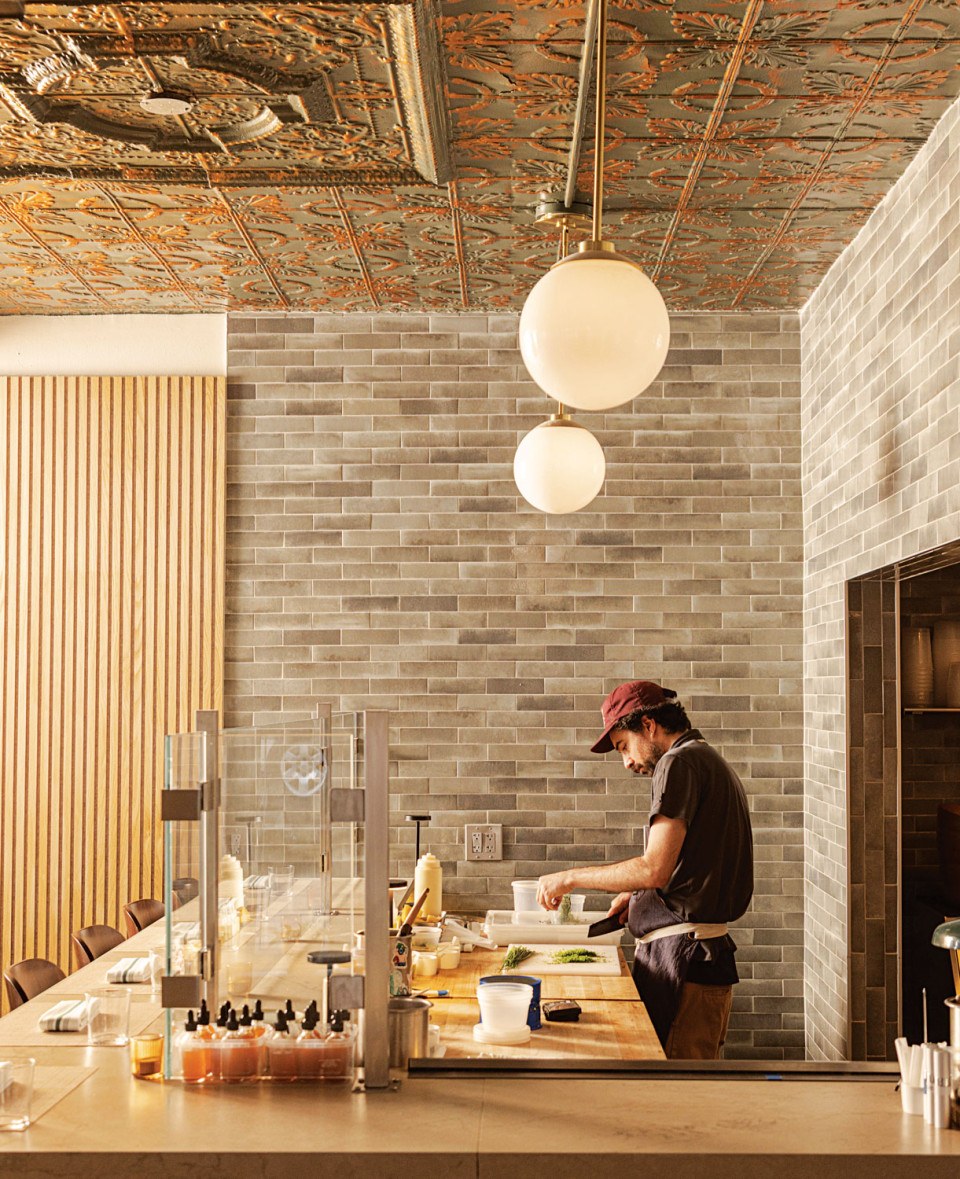
The raw bar from Little Water
There is nothing in the world more comforting to me than fish and potatoes. In my worst moments, that is what I’ve craved. In my best, that’s how I’ve wanted to celebrate. A simple piece of fish, a little starch, warm and filling. It says sunlight and the sound of water to me. It speaks of a friend’s bar in the mountains where my comfort order was a piece of sole, a white wine beurre blanc, and mashed potatoes. And I suspect it says something similar to the Ruckers. That somewhere, they’ve felt that same comfort, and here, on this single plate, have chosen to glorify it with a simple fish and gorgeous technique. That, at its heart, is what all of Little Water is about.
And of course, I’m not saying that’s all I ate. Or even that it was the only thing that was good. I’m not saying I didn’t sit there arguing about parking garages and TV shows, drinking gin and forking smooth bites of bay scallop from a bath of olive oil and yuzu kosho bright enough to make my mouth pucker; that I didn’t sit in the dining room, alone, mouthing along with the words to “Scarlet Begonias” with a dipshit smile on my face, in love with the smart riff (and waxed-paper trashiness) of a peekytoe crab salad and uni set atop two perfectly golden bricks of hash brown so sharp-angled and geometric that their architecture was as stunning as the flavor.
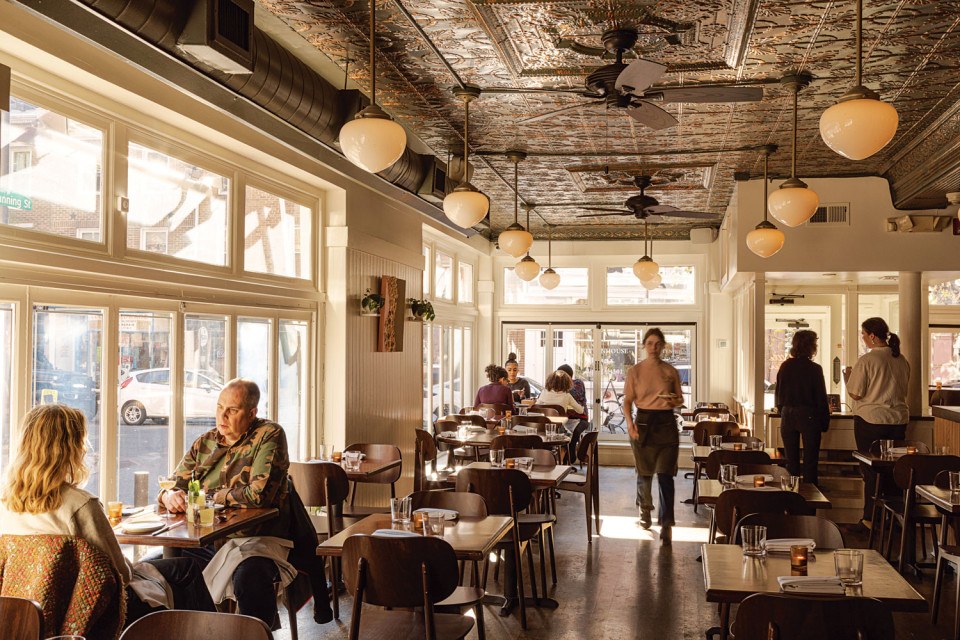
Little Water’s dining room
Because of course I did. And of course it all mattered because Little Water is all those other things, too — history and biography, the menu inspired by a cook’s loves and lives spent close to the water — but mostly it’s about geography. Randy and Amanda call it a “coastal love letter,” and that’s accurate because Little Water is a map of what they adore, all of it made beautiful.
But none of it will ever mean as much to me as one single plate of fish and potatoes. And I hope they understand what a compliment that is.
4 Stars — Come from anywhere in America
Rating Key
0 stars: stay away
★: come if there are no other options
★★: come if you’re in the neighborhood
★★★: come from anywhere in Philly
★★★★: come from anywhere in America
Published as “The Depths of Little Water” in the June 2025 issue of Philadelphia magazine.
